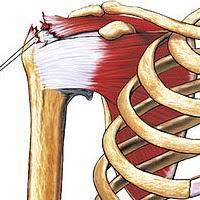Testosterone and Estrogen Deficiency Associated With Increased Risk of Rotator Cuff Surgery
 As we age, our vital hormone levels begin a slow, torturous descent. The loss of our hormones begins as a trickle when we enter our 30s, and by the time we reach our 70s, it turns into a cascade.
As we age, our vital hormone levels begin a slow, torturous descent. The loss of our hormones begins as a trickle when we enter our 30s, and by the time we reach our 70s, it turns into a cascade.
The results of this hormonal nosedive are hideous: loss of strength and muscle, fatigue, depression, joint aches and pains, insomnia, weight gain, an accumulation of fat, dry, wrinkled skin, and mental confusion.
Hormone Balance is intrinsically vital to well-being. While Estrogen and Testosterone are most well-known as sex hormones, they perform numerous other vital functions. A study in a recent edition of The Journal of Bone & Joint Surgery explores how Sex Hormone Deficiency can impair the musculoskeletal system.
In this case, low levels of female Estrogen or male Testosterone were correlated with a higher risk of rotator cuff injury.
The Rotator Cuff is Critical to Movement and Prone to Injury
The rotator cuff is a union of muscles that keep your arm in its socket. These muscles extend into tendons that cap the humerus, where it intersects the shoulder. These muscles allow you to perform unrestrained shoulder movements while keeping your arm locked into the socket. If any of these tendons are damaged, this leads to pain, mobility issues, and an increased risk of serious injury.
Rotator cuff tears can result directly from an acute injury and age-related degeneration. It is well-documented that the risk of rotator cuff injury is exacerbated by poor blood supply, repetitive stress, and bone spurs. This study shows that Primary Sex Hormone Deficiency can also contribute to the risk of rotator cuff injury.
Using Insurance Records to Track the Incidence of Rotator Cuff Injury
This study was headed by Dr. Peter N. Chalmers of the University of Utah. It utilized data derived from two separate medical databases. Rotator cuff tears are common among men and women and are documented to become more common as patients get older. A patient's Primary Sex Hormone Levels correlate with their risk of experiencing a rotator cuff tear.
Dr. Chalmers analyzed data from almost 230,000 men and women who had rotator cuff surgery between 2008 and 2017. This medical info was collected  from a database maintained by health insurers. The results were highly controlled since there were so many participants. They were matched by sex, age, and source of insurance and were compared to similar individuals who did not have the surgery.
from a database maintained by health insurers. The results were highly controlled since there were so many participants. They were matched by sex, age, and source of insurance and were compared to similar individuals who did not have the surgery.
In all, 42% of the experimental group were women, and the mean age of this group was 54. The control group had very similar characteristics to the experimental group, except those who underwent surgery were likelier to be smokers.
When reviewing medical insurance data, researchers found that 7% of males that underwent surgery were diagnosed with Testosterone Deficiency, while 27% of women were diagnosed with Estrogen Deficiency.
In the control group, 4% of men were diagnosed with Low-T, while 20% of women had received a Hormone Deficiency Diagnosis. After considering confounding factors, Chalmers and his associates found that men with Low-T were 89% more likely to have had Rotator Cuff Surgery, while women were 48% more likely.
Second Study Shows Similar Link Between Hormone Deficiency and Rotator Cuff Injury
After collecting and cleaning up this data, they compared these results to a second database, independent of the insurance company database. They worked with the Veterans Administration Genealogy database. This government archive organizes data from millions of patients that have utilized Veterans Administration medical services.
This data was put under similar scrutiny as the medical insurance records. Dr. Chalmers found that Low-T increased the odds of having had Rotator Cuff surgery three times. A diagnosis of Estrogen Deficiency in women made women 2.5 times as expected to have had the surgery.
 These results corroborate with preliminary data collected by the research team. In another study, women with a particular estrogen-receptor mutation had an increased risk of rotator cuff disease and a lower success rate in surgery for the condition.
These results corroborate with preliminary data collected by the research team. In another study, women with a particular estrogen-receptor mutation had an increased risk of rotator cuff disease and a lower success rate in surgery for the condition.
So what to do? You could, of course, just sit back and do nothing. But why suffer the pain of a torn rotor cuff and the expense of surgery if you can avoid it? Restoration of your youthful levels of hormones may prevent this issue from occurring in the first place.
And if you already suffer from shoulder issues, hormone restoration is something you should definitely consider.
Contact us for a FREE, no-obligation discussion concerning the benefits of hormone replacement therapy.
- What Are Normal Testosterone Levels For Men And Women Throughout Life? [Last Updated On: February 14th, 2025] [Originally Added On: May 26th, 2020]
- Top Tips For Boosting Testosterone Naturally [Last Updated On: November 6th, 2024] [Originally Added On: May 27th, 2020]
- The Testosterone Factor [Last Updated On: December 23rd, 2024] [Originally Added On: May 28th, 2020]
- Testosterone Can Help Relieve The Menopause Symptom Of Hot Flashes [Last Updated On: February 14th, 2025] [Originally Added On: May 29th, 2020]
- How Does Low Testosterone Cause Infertility? [Last Updated On: February 8th, 2025] [Originally Added On: May 30th, 2020]
- The Benefits Of Testosterone Therapy For Prostate Cancer [Last Updated On: February 14th, 2025] [Originally Added On: May 31st, 2020]
- Is Testosterone Replacement A Valid Diabetes Treatment? [Last Updated On: February 15th, 2025] [Originally Added On: June 1st, 2020]
- Testosterone Shock Therapy May Be An Effective Prostate Cancer Treatment [Last Updated On: February 5th, 2025] [Originally Added On: June 2nd, 2020]
- Testosterone Replacement Therapy Is Safe For The Heart [Last Updated On: February 14th, 2025] [Originally Added On: June 3rd, 2020]
- Testosterone Replacement Therapy [Last Updated On: December 20th, 2024] [Originally Added On: June 4th, 2020]
- Testosterone Patches [Last Updated On: February 8th, 2025] [Originally Added On: June 5th, 2020]
- Testosterone Overview [Last Updated On: February 13th, 2025] [Originally Added On: June 6th, 2020]
- Testosterone Levels And Making Money [Last Updated On: October 19th, 2024] [Originally Added On: June 7th, 2020]
- Testosterone Enanthate [Last Updated On: October 18th, 2024] [Originally Added On: June 8th, 2020]
- Increased Awareness Of Low-t Helps Men Live Healthier Lives [Last Updated On: February 7th, 2025] [Originally Added On: June 9th, 2020]
- How Does Low-t Lead To Erectile Dysfunction? [Last Updated On: February 7th, 2025] [Originally Added On: June 10th, 2020]
- Testosterone Basics [Last Updated On: February 6th, 2025] [Originally Added On: June 11th, 2020]
- How Does Testosterone Impact Prostate Health? [Last Updated On: February 6th, 2025] [Originally Added On: June 12th, 2020]
- Testosterone And Other Sex Hormones Impact Asthma Response Dependent On Sex [Last Updated On: February 5th, 2025] [Originally Added On: June 13th, 2020]
- Recognizing Subtle Symptoms Of Testosterone Deficiency [Last Updated On: February 4th, 2025] [Originally Added On: June 15th, 2020]
- Testosterone Trivia [Last Updated On: February 4th, 2025] [Originally Added On: June 16th, 2020]
- The Health Benefits Of Testosterone And Sleep Are Interconnected [Last Updated On: February 3rd, 2025] [Originally Added On: June 17th, 2020]
- How Can I Restore My Testosterone Production Naturally? [Last Updated On: October 13th, 2024] [Originally Added On: June 18th, 2020]
- Low-t Quiz [Last Updated On: October 12th, 2024] [Originally Added On: June 19th, 2020]
- Low Testosterone Might Mean Poor Sleep Need Testosterone Hormone Injections [Last Updated On: October 11th, 2024] [Originally Added On: June 20th, 2020]
- Low Testosterone Contributes To Frailty With Age [Last Updated On: October 10th, 2024] [Originally Added On: June 21st, 2020]
- Low Testosterone Affects A Third Of Young Men With Type 2 Diabetes [Last Updated On: October 9th, 2024] [Originally Added On: June 22nd, 2020]
- Japanese Testosterone Study Proves Physical And Psychological Benefits [Last Updated On: October 8th, 2024] [Originally Added On: June 23rd, 2020]
- Intramuscular Injections Are Safer Procedures [Last Updated On: October 7th, 2024] [Originally Added On: June 24th, 2020]
- Injecting Testosterone (im) [Last Updated On: December 21st, 2024] [Originally Added On: June 25th, 2020]
- Injectable Testosterone And Testosterone Cream [Last Updated On: February 14th, 2025] [Originally Added On: June 26th, 2020]
- Indiana Jones Vs. Rambo (hgh Testosterone) [Last Updated On: October 6th, 2024] [Originally Added On: June 27th, 2020]
- How Much Does Testosterone Control Men's Behavior? [Last Updated On: October 5th, 2024] [Originally Added On: June 28th, 2020]
- Getting To The Bottom Of Low-t Under-reported Sources Of Testosterone Deficiency [Last Updated On: February 14th, 2025] [Originally Added On: June 29th, 2020]
- How To Manage And Overcome Testosterone Deficiency [Last Updated On: October 4th, 2024] [Originally Added On: June 30th, 2020]
- Clomiphene Low-testosterone Andropause Treatment [Last Updated On: February 3rd, 2025] [Originally Added On: July 1st, 2020]
- How Do Synthetic Chemicals Impact Testosterone Secretion? [Last Updated On: September 26th, 2024] [Originally Added On: July 2nd, 2020]
- Interest In Bio-identical Testosterone Is Skyrocketing [Last Updated On: October 3rd, 2024] [Originally Added On: July 3rd, 2020]
- Axiron Spray-application Testosterone Replacement Therapy [Last Updated On: October 2nd, 2024] [Originally Added On: July 4th, 2020]
- Andropause: Male Menopause [Last Updated On: October 24th, 2024] [Originally Added On: July 5th, 2020]
- Testosterone Deficiency Treatment Options [Last Updated On: September 29th, 2024] [Originally Added On: July 6th, 2020]
- The Facts About Testosterone Hrt For Low-t [Last Updated On: September 30th, 2024] [Originally Added On: July 7th, 2020]
- Misconceptions About Testosterone Replacement Therapy [Last Updated On: October 1st, 2024] [Originally Added On: July 8th, 2020]
- Testosterone Replacement Therapy Facts And Myths [Last Updated On: October 23rd, 2024] [Originally Added On: July 9th, 2020]
- Testosterone Injections For Testosterone Deficiency [Last Updated On: September 18th, 2022] [Originally Added On: July 10th, 2020]
- Testosterone Replacement Therapy May Help Aging Males Prevent Diabetes [Last Updated On: September 27th, 2024] [Originally Added On: July 11th, 2020]
- The Benefits Of Testosterone Replacement Therapy For Women [Last Updated On: September 25th, 2024] [Originally Added On: July 13th, 2020]
- How Can Testosterone Hrt Improve My Life Via Quality Low-t Treatments [Last Updated On: October 22nd, 2024] [Originally Added On: July 14th, 2020]
- Frequently Asked Questions About Testosterone [Last Updated On: September 28th, 2024] [Originally Added On: July 15th, 2020]
- Bio-identical Testosterone Cypionate Injections [Last Updated On: September 24th, 2024] [Originally Added On: July 16th, 2020]
- All About Testosterone Creams [Last Updated On: September 21st, 2024] [Originally Added On: July 17th, 2020]
- Low Testosterone Treatment Protocols [Last Updated On: July 1st, 2024] [Originally Added On: July 19th, 2020]
- Testosterone Deficiency Drains Your Energy [Last Updated On: February 13th, 2025] [Originally Added On: July 21st, 2020]
- What Is Testosterone? [Last Updated On: September 19th, 2024] [Originally Added On: July 23rd, 2020]
- Eleven Signs Of Testosterone Deficiency [Last Updated On: March 30th, 2025] [Originally Added On: July 26th, 2020]
- Hypertension-Associated Cardiovascular Risks Increase Due To Both Low-T And High Testosterone [Last Updated On: February 18th, 2025] [Originally Added On: April 22nd, 2021]
- Everything to Know About Androgel [Last Updated On: March 27th, 2025] [Originally Added On: July 8th, 2021]
- Kinds of Testosterone Therapy – Which Is Right for You? [Last Updated On: March 21st, 2025] [Originally Added On: August 28th, 2021]
- This Study Says High Protein Diet May Suppress Testosterone Levels [Last Updated On: February 20th, 2025] [Originally Added On: March 28th, 2022]
- Low Testosterone Accelerates Aging [Last Updated On: March 20th, 2025] [Originally Added On: May 3rd, 2022]
- Low Testosterone Endangers Your Health [Last Updated On: February 14th, 2025] [Originally Added On: May 14th, 2022]
- Testosterone Helps Modulate Immune Activity in the Digestive System [Last Updated On: February 14th, 2025] [Originally Added On: May 18th, 2022]
- Did you know: Testosterone treats depression! [Last Updated On: December 28th, 2024] [Originally Added On: May 19th, 2022]
- Benefits of Fenugreek – Boost Testosterone and More [Last Updated On: February 14th, 2025] [Originally Added On: May 23rd, 2022]
- Testicle Tanning: What is Tucker Carlson Talking About? [Last Updated On: July 17th, 2024] [Originally Added On: June 3rd, 2022]
- Using Testosterone to Combat Memory Issues in Diabetics [Last Updated On: February 14th, 2025] [Originally Added On: August 16th, 2022]
- About 40% of Men Have Low-T – and it Doubles the Risk of Severe COVID [Last Updated On: February 25th, 2025] [Originally Added On: September 21st, 2022]
- The Foods To Boost Your Testosterone…And The Foods To Avoid [Last Updated On: December 27th, 2024] [Originally Added On: September 30th, 2022]
- Tlando Testosterone: An Innovative Oral Therapy for Low-T [Last Updated On: December 27th, 2024] [Originally Added On: October 1st, 2022]
- Testosterone Replacement Therapy (TRT) Explained [Last Updated On: July 9th, 2024] [Originally Added On: October 12th, 2022]
- Examining The Link Between Testosterone and Employability [Last Updated On: February 18th, 2025] [Originally Added On: November 8th, 2022]
- Standard Measure of Low Testosterone Doesn't Apply to Young Men [Last Updated On: March 12th, 2025] [Originally Added On: November 8th, 2022]
- Surprising Things that Cause Men’s Crashing Testosterone [Last Updated On: March 17th, 2025] [Originally Added On: January 5th, 2023]
- Understanding the Correlation between Testosterone Levels and Job Performance [Last Updated On: February 9th, 2025] [Originally Added On: February 9th, 2025]
- Link between Low Testosterone and Severe COVID Symptoms in Men [Last Updated On: February 12th, 2025] [Originally Added On: February 12th, 2025]
- The Good Job Grip: Is Testosterone the Key? [Last Updated On: February 13th, 2025] [Originally Added On: February 13th, 2025]
- Importance of Nutritional Balance in a Healthy Diet [Last Updated On: February 14th, 2025] [Originally Added On: February 14th, 2025]
- Invigorating Power of the Fenugreek Plant: A Natural Testosterone Energizer and More [Last Updated On: February 14th, 2025] [Originally Added On: February 14th, 2025]
- Unlocking the Testosterone Treasure: A Panacea for Cognitive Woes in Diabetic Patients [Last Updated On: February 14th, 2025] [Originally Added On: February 14th, 2025]
Word Count: 752







